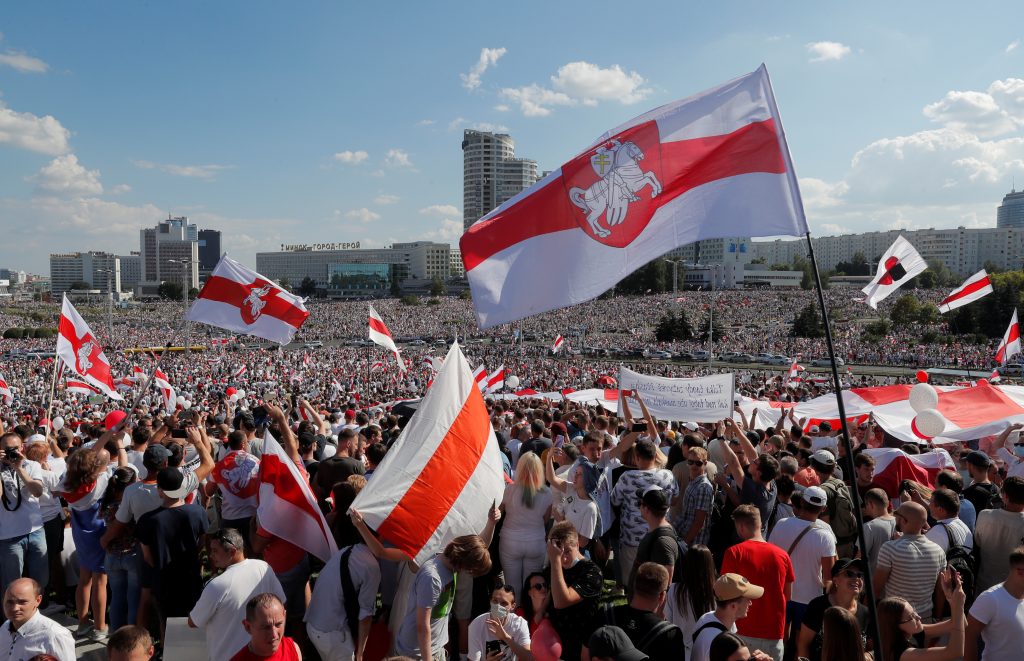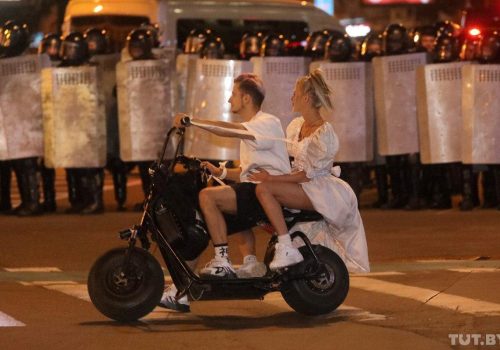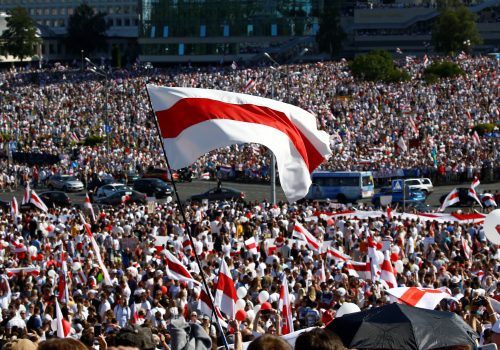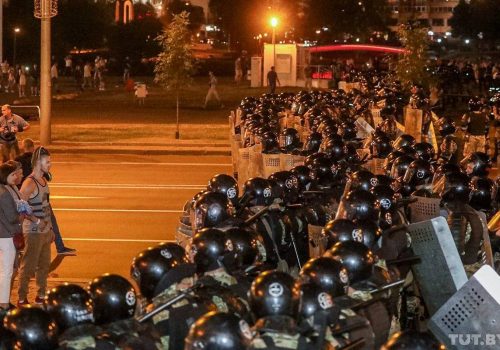Judging by the massive demonstrations taking place in Belarus, another “color revolution” is underway with the potential to topple a post-Soviet strongman ruler in the name of democracy and justice. However, there are no guarantees that Alyaksandr Lukashenka will flee like his Ukrainian counterpart Viktor Yanukovych in 2014.
For now, Lukashenka remains defiant. In order to remain in power, he seems to have only three choices. He can try to wear down the demonstrators through arrests and episodic resort to violence, but that option seems inadequate given the strength of demonstrations. He could resort to mass violence or martial law to stay in power, using his own forces. But not enough of them may be willing to act against their countrymen. Alternatively, he may decide to rely on Putin to supply the necessary force, either directly or by using unidentified “little green men”, as RT head Margarita Simonyan has urged and Lukashenka himself has hinted at.
Putin faces tough choices and dilemmas with respect to Belarus. The Russian leader hates color revolutions in general. The fact that this is now happening in a country regarded as basically Russian by many in the Kremlin makes it even worse. A successful color revolution next door could serve as an obvious precedent for a similar scenario in Russia itself, where elections are hardly less fraudulent than in Belarus.
Despite Putin’s obvious dislike of popular democratic movements, intervention to keep Lukashenka in power has major risks. Lukashenka doesn’t seem to have much domestic support left, so violent Russian intervention in Belarus on his behalf could become a long-term liability. It would also likely be unpopular in Russia, where Putin’s ratings are already in decline.
Putin could try to identify a successor to Lukashenka capable of capturing greater social support while not challenging what Putin considers his core interests. This would follow the so-called Armenian scenario, where popular Prime Minister Nikol Pashinyan won power in 2018 without generating Russian hostility. However, Belarus’s currently opposition leaders, including the probable actual winner of the August 9 presidential election Svyatlana Tsikhanouskaya, may not be controllable.
Additionally, Putin’s margin for Belarusian autonomy, given its common border with the European Union (EU) and NATO, may be less than in Armenia. While not impossible, it seems unlikely that Putin could accept Tsikhanouskaya, who was pro-Western enough to seek refuge in EU and NATO member Lithuania.
The West also faces challenging choices. Neither the United States nor its allies currently know what Lukashenka is capable of or what Putin will do. Russian intervention may be unlikely, but it cannot be ruled out.
For the West, the best-case outcome is a peaceful transfer of power from Lukashenka, perhaps through re-run elections, either over Lukashenka’s objections or after his departure. This would result in a new government with public legitimacy.
If, in this optimistic scenario, Putin suggested support for re-run elections under OSCE supervision, the West would likely agree fast. If Putin suggested that Lukashenka’s fate was none of his concern and that Belarus’s next president ought to be the decision of the Belarusian people, the West should respond with a trust-but-verify welcome while not allowing Putin the room to install his own person in Belarus.
In this case, Putin or his people might ask the West to throw in guarantees of no EU or NATO membership for Belarus. Ever.
Western policymakers should resist any such deal over the heads of the Belarusian people that the Kremlin would interpret as consigning Belarus to the Russian sphere of domination. That would be a poor way to respond to a national democratic movement in Belarus. Of course, it is also clear that neither the EU nor NATO are currently interested in considering Belarusian membership. At this point, starting a debate on the subject would be divisive in Europe, the United States, and Belarus for no good reason.
In the worst-case scenario of escalating violent repression, whether at the hands of Lukashenka or Putin, the United States should support Belarus society for the long-term. We know how to do so: RFE/RL broadcasting; support for civil society groups; and support for independent journalism both inside and outside of Belarus.
Sanctions may have a place in advancing the objective of a peaceful outcome in Belarus that respects the apparent choice of the people there for new, democratically-minded leadership.
This should involve targeting the Lukashenka regime. First, the (relatively) easy part: to deter Lukashenka and whatever remains of his regime from more violence against their own society, the United States and EU should impose sanctions on individuals in the regime responsible for the recent repression. That should include Lukashenka (who is currently under US though not EU sanctions) and his remaining supporters in government.
We should not stop with the individuals themselves but should seek out their financial assets abroad. We should also target lower-level officials, gathering names using our own assets and consulting with Belarusian opposition figures, who are likely to have more detailed knowledge and will probably be eager to share it.
The purpose would be to establish accountability and, especially, to deter others in the regime who may be on the fence about continued loyalty to Lukashenka by demonstrating that they cannot expect anonymity or impunity for their actions. Speed, therefore, is critical. The United States should state its intention to adopt this approach and then quickly follow with designations of those involved in repression. Such sanctions can be implemented quickly and with low risk of unintended consequences.
EU foreign ministers decided on August 14 to launch individual sanctions and the United States should seek to work with the EU, sharing information and coordinating timing and names as much as possible. Doing so would magnify the impact. EU rules of unanimity for imposing sanctions may be an obstacle. Germany’s role in forging an EU consensus will be critical, much as it was and remains with respect to EU sanctions following Putin’s attack on Ukraine.
As a vehicle for individual sanctions, the United States could use either the existing Belarus Executive order (E.O. 13405, of June 2006) or the Global Magnitsky Act, already known to Russian and Belarusian dissidents, as implemented by the Trump Administration’s Executive order 13818. Both also provide flexibility for removing sanctions, an important tool should Belarus reach a point in a post-Lukashenka period where it wants to offer a way forward for some sanctioned members of the former regime as part of a national reconciliation process.
The United States and EU may want to be more cautious about re-imposing sanctions against the Belarus economy generally or even against key state-owned companies. For one thing, some Belarusian dissidents and democracy activists have argued against doing so, on the grounds that it may alienate people in Belarus. Their views ought to count. Indeed, workers in some of the major state-owned industrial plants appear to be joining the resistance to the regime. It might seem a poor way to respond by seeking to damage their enterprises.
Eurasia Center events

Deterring Putin is a priority. Even though some argue that the chances of Putin launching an intervention are not great, circumstances in Belarus could change and make this more likely. It is important to caution Putin against such action.
Sanctions shouldn’t be the main vehicle here. Diplomatic warnings and demonstration of transatlantic determination to support Belarus will be more important (whether President Trump is willing to caution Putin is sadly unclear). However, sanctions can also play a role.
By the end of 2014, the United States and EU had agreed on the basic framework of sanctions imposed in response to Russia’s attack on Ukraine. They also discussed escalatory sanctions options should Russia intensify its aggression against Ukraine. Crucially, they made sure the Russians knew that such options existed, strong enough to hurt the Russian economy but not so strong that the United States and EU would never pull the trigger on them. Those options and others are still available (notwithstanding US National Security Advisor Robert O’Brian’s August 9 suggestion on “Face the Nation” that America has no additional sanctions options against Russia).
The United States, EU, and United Kingdom (which has announced its intention to use sanctions in response to the violent crackdown in Belarus) should immediately prepare economic sanctions options to be launched should Putin invade Belarus directly or via the deployment of little green men. As the West did with Ukraine, they should make clear to the Kremlin that these options exist, and so does the political will to use them.
Such sanctions could include intensification of sanctions against the Russian financial sector; intensification of energy technology sanctions; and intensified restrictions on exports to Russia of military, dual-use, or other cyber technology, including by reestablishment of an allied coordination mechanism to manage these over the longer-term.
Sending a strong message now, before Putin has committed himself to a violent course of action, might head it off by disabusing Putin of the notion that the West is so divided and distracted he can attack another neighbor with impunity.
Some of these options have already been included in pending legislation, such as the DETER Act or DASKAA, which seeks to use sanctions to deter Russia from other forms of aggression such as attempted interference in US elections. But the US Administration does not need legislation to prepare sanctions options. It can use existing authorities or issue new Executive orders to deal with potential Russian aggression against Belarus.
Again, speed in messaging and enforcing the credibility of the threat is crucial. If Russia does indeed send troops, there will inevitably be a legislative push in the United States to impose sanctions on Moscow. But such sanctions after the fact would merely be punishment. It would be unlikely to help the Belorusian people in their struggle for democracy.
One key factor will be Germany’s willingness to support a strong EU and transatlantic position to deter potential Russian aggression against Belarus. Germany played an essential role in supporting EU sanctions in response to Putin’s attack on Ukraine. The Trump Administration, for once, should put aside its instinct to pick fights with Germany and focus instead on achieving the strongest possible consensus with Berlin to prevent Putin from moving against another neighbor.
If the two governments were able to work creatively together, even the bitter US-German fight over the Nord Stream II gas pipeline project – still supported by Germany in the face of sustained US objections and even sanctions – could provide an additional tool against Russian aggression in Belarus. A German statement now that Putin’s intervention in Belarus would cause Germany to rethink its position on Nord Stream II would be a powerful and perhaps decisive signal. If Berlin cannot take that position, it will critical to the credibility of Germany’s policy toward Russia that it rapidly signal support for additional sanctions should Putin intervene in Belarus.
Events in Belarus are moving fast. Europe, the United States, and the United Kingdom have the tools to try to prevent the worst and strengthen the odds of a better outcome for the Belarusian people. They should use them without delay.
Daniel Fried is a Distinguished Fellow at the Atlantic Council. Brian O’Toole is a Nonresident Senior Fellow at the Atlantic Council.
Further reading
The views expressed in UkraineAlert are solely those of the authors and do not necessarily reflect the views of the Atlantic Council, its staff, or its supporters.

The Eurasia Center’s mission is to enhance transatlantic cooperation in promoting stability, democratic values and prosperity in Eurasia, from Eastern Europe and Turkey in the West to the Caucasus, Russia and Central Asia in the East.
Follow us on social media
and support our work
Image: Hundreds of thousands attend a pro-democracy rally in central Minsk on August 16, 2020 as unprecedented numbers of Belarusians call for change following a rigged presidential vote and a brutal crackdown on protesters. (REUTERS/Vasily Fedosenko)




